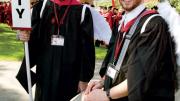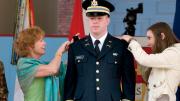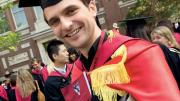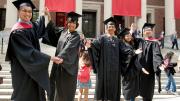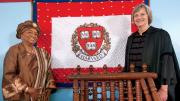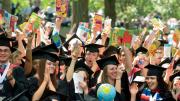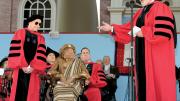How does the modern, rational research university assure clement conditions for graduation? Witchcraft.
Harvard’s Commencement planners kept an increasingly wary eye on the forecasts during a 10-day mid-May siege of fog, rain, and drizzle. The gloom began to lift on Tuesday afternoon, around the time of the Baccalaureate exercises in Memorial Church; and Wednesday, with class days all over campus, was a stunner, made all the more appealing by the persistence of lilacs, dogwoods, and azaleas—a bonus of the cool, late spring—and the arrival of their usual successors (rhododendrons, irises). A good omen.
But the deal remained unsealed until Wednesday night. Then, in the toast offered on behalf of her fellow honorands at the annual celebratory dinner in Annenberg Hall, Liberian president Ellen Johnson Sirleaf told the guests that when she spoke at the Harvard Kennedy School (her alma mater) at its 2008 graduation, “It rained. It really rained.” And so, before setting out for Harvard to be the principal Commencement speaker, “I consulted our witch doctors and told them to be sure to send the African sun behind me.” “If it rains,” she said, “I’ll just have to dispense with the witch doctor society.” Their status is secure: May 26 was all of high spring packed into one cloudless day.
Sirleaf brought more tangible magic, too. At the end of her toast, forging a bond “from one woman president to another woman president,” she presented Drew Faust with a hand-sewn quilt from the rural Liberian community of Arthington, complete with the VERITAS shield. An obviously delighted Faust had it hung directly behind her chair on the blue backdrop of the Memorial Church dais, for all to see, on Commencement day.
Commencement, one is annually reminded, is about beginnings. Timothy J. Lambert ’11, as one of two Harvard Orators on senior class day, did the honors this year: “The word means beginning.” But as undergraduates above all know, it also means the sad end of four distinctive years.
Endings were pervasive and poignant during Harvard’s 360th Commencement.Speaking in Memorial Church, where the Reverend Peter J. Gomes long delivered spellbinding sermons, President Faust meditated on the meaning of his life in her first Baccalaureate service since his death on February 28 (see "Words to Live By"). At the opening of the Thursday morning exercises, the chaplain of the day, Bernard Steinberg of Hillel, prefaced his prayer by saying, “In memoriam: James DiPaola and Peter J. Gomes.” The former, the late sheriff of Middlesex County, who had ridden a horse through Harvard Yard and, “combining dignity and irony,” had opened and closed the morning exercises for a decade, committed suicide last November. “[M]y friend Peter,” who had read the Commencement benediction from his cap for four decades, was gone as well. Offering the benediction this year in Gomes’s place, his interim successor as acting Pusey minister, Wendel W. Meyer, echoed the remembrance, beginning simply, “Life is short….”
Leave-takings by the living were noted as well—people who had acted on the University’s behalf: former Senior Fellow James R. Houghton (see "Honoris Causa"); Steven E. Hyman, the departing provost (see "Center of Attention" and "The New Provost"); and Barbara Grosz, who is stepping down as Radcliffe Institute dean (see "Brevia").
It was a mostly serious week—perhaps in part because with a head of state (Sirleaf) and a Supreme Court justice (Ruth Bader Ginsburg) as official guests, and an impromptu appearance by Vice President Joe Biden and others (see "Commencement Confetti"), there were plenty of security officers on hand. Even actor Alec Baldwin, who might have riffed on the comic 30 Rock, told the Law School’s class day crowd, “From the bottom of my heart, I envy you.” Revealing a lifelong interest in the law, he said, “I believe that I would trade what I have for what you’ll have tomorrow afternoon.”
But there were leavening moments of humor, too. During the morning exercises, conducted with running-the-trains-on-time efficiency, Harvard Divinity School dean William A. Graham introduced his candidates for degrees with a knowing ad lib: “I have the honor to present to you these women and men, each of whom has devoted two, three, or more—sometimes many more—years to theological and religious studies….” The provost, limning the honorands’ distinctions, identified a two-fer: both Dudley R. Herschbach and Plácido Domingo have played themselves on episodes of The Simpsons. And at his luncheon spread, U.S. Secretary of Education Arne Duncan ’86, elected chief marshal by his twenty-fifth reunion class, described his reaction to working with the “Happy Committee,” the alumni body that oversees Commencement. In Washington, Duncan noted, he worked on lots of committees—none of them happy.
Faust spoke most emotionally in her Baccalaureate address and in her brief remarks at the ROTC commissioning ceremony. There, invoking the 150th anniversary of the beginning of the Civil War (her scholarly field as historian), she summoned the memory of Charles Russell Lowell, valedictorian of the class of 1854, and Robert Gould Shaw, class of 1860, both of whom died in the war, and Oliver Wendell Holmes Jr., class of 1861, thrice wounded, and observed, “We are not the first to live in an era of peril and crisis. With our country involved in conflicts at three sites around the globe, you as military officers have chosen to face very difficult challenges and to assume grave responsibilities.…I hope that your place in a long and newly invigorated Harvard tradition of military service and sacrifice supports and inspires you in the months and years to come.” Her afternoon-exercises remarks, the next day, focused on the role of and challenges to higher education.
Sirleaf spoke about hopeful signs that democracy was taking root in Africa, and that her war-ravaged country was progressing toward reconciliation and a climb from poverty, and drew upon her harrowing life experiences to share wisdom with the graduates (see "Words to Live By").
Some of the most morally forceful rhetoric came from others who, like Sirleaf, live or work in the developing world. Partners In Health co-founder Paul Farmer, named Kolokotrones University Professor during the year, said in his Kennedy School graduation speech that earthquake-ravaged Haiti, where he has labored for decades to deliver healthcare to the rural poor, had taught him to “beware the iron cage of rationality.” He confessed, “We all wanted to be saved by expertise, but we never were.” Instead, he said, making headway requires that we learn to “accompany someone”—“to go somewhere with him or her, to break bread together, to be present on a journey with a beginning and an end.…Accompaniment is much more often about sticking with a task until it’s deemed completed by the person or person being accompanied, rather than by the accompagnateur.” Radcliffe Medalist Ela Bhatt, founder of the Self Employed Women’s Association, in India, said of some of the world’s most marginalized people, “It is the margins that define the center.”
Rhetoric aside, the graduates could learn much from the behavior modeled around them. In “What Really Matters,” a column in the Commencement issue of the Crimson, Rabb professor of anthropology and professor of psychiatry Arthur R. Kleinman (see "Mentoring and Moral Experience"), wrote that education is for self-cultivation but “ultimately also for our responsibilities for those we love, for those we teach, and for those we live amongst.”
To an unusual degree, the 2011 Commencement seemed to display families who have been blessed with long relationships, among themselves and with Harvard—from leading University figures such as honorand Dudley R. Herschbach (see "Center of Attention") to newly named Fellow of the Corporation Joseph J. O’Donnell (see "Commencement Confetti"). At the Graduate School of Arts and Sciences diploma ceremony, newly minted A.M.s, S.M.s, and Ph.D.s were accompanied by spouses and children (see "Commencement Confetti"). And the reunion parade, as always, was a multigenerational event, with the young, where needed, helping the old (see "Senior Seniors"). All present, participants and guests, were enjoying those relationships on a gift of a day.
Thank you, witch doctors. Please mark May 24, 2012, on your calendars.

